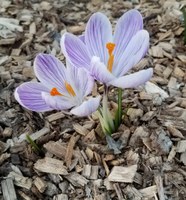Dakota Gardener: Mulch for the garden
(Click an image below to view a high-resolution image that can be downloaded)
By Kelsey Deckert, Horticulture agent
NDSU Extension – Burleigh County
Do you utilize mulch in the garden? If you do that’s great! If you don’t, you should consider adding mulch to the garden, as there are many benefits. Benefits of mulch include preserving moisture, reducing weed pressure and erosion. These are great reasons to incorporate mulch in the garden! The big question is what type of mulch to utilize?
There are two categories of mulch: inorganic and organic mulch. Let’s explore different types of each and why they may be incorporated into the landscape.
One of the most common types of mulch used is rock. This is by far the worst choice for plants! They offer no benefits to the plants and, in fact, cause harm to the plants. Rock mulch is aesthetically pleasing, low maintenance and wind resistant. However, it is a heat trap for plants which can lead to scorching on plants.
Another type of inorganic mulch is plastic mulch. Benefits of plastic mulch include that it captures heat, reduces erosion and weed pressure. However, plastic mulch isn’t water permeable, is only good for about one season and is hard to remove in the fall.
Landscaping fabric is inorganic mulch that is permeable, reduces weed pressure and can last several years. Some cons of utilizing this type of mulch are that it can cause compaction after several years. Gardeners will want to use a propane torch to create holes in the fabric to prevent fraying, and there will be residue to clean off in the fall.
Organic mulches are the best option in the garden, speaking from a plant perspective. Organic mulches decompose over time, don’t cause any type of heat scorch, can improve soil health, conserve moisture and aid in weed control. Organic mulches include: wood chips, grass clippings, straw, cocoa bean shells or paper mulch.
Wood chips are a very popular option and come in a variety of colors. They can be easily obtained from many municipal waste facilities and big box stores. The downfall of wood chips is that they can get blown out of the garden due to wind.
Straw and grass clippings can provide great soil coverage in the garden and help suppress weeds. The disadvantage of straw is that it could contain weed seeds. While grass clippings can give back some nitrogen to the plants it is placed around, the biggest concern about utilizing grass clippings is if any type of herbicide has been used, you then have the potential for herbicide injury in the garden. Avoid any grass clippings if herbicide was used.
Cocoa bean shells are one of my favorite mulches as they provide a great pop of color and a wonderful smell in the garden! They break down easily, but I have heard other gardeners complain about the mold that develops from them breaking down.
The last type of organic mulch is a paper mulch that can be in the form of newspaper or painter’s paper. Both provide great weed control; however, the disadvantage of paper mulch is that it is short-lived, only good for about one growing season.
When selecting a mulch for the garden, decide what your goals are, whether it is weed suppression or long-term usage. Determining your goals will help you determine the best option for you.
For more information about mulches for your garden, contact your local NDSU Extension agent. Find the Extension office for your county at ndsu.ag/countyoffice.
NDSU Agriculture Communication – May 7, 2025
Source: Kelsey Deckert, 701-221-6865, kelsey.j.deckert@ndsu.edu
Editor: Kelli Anderson, 701-231-6136, kelli.c.anderson@ndsu.edu




